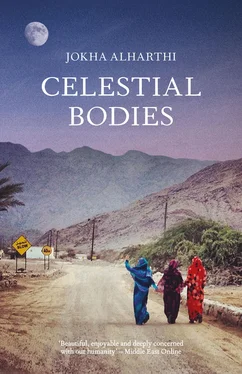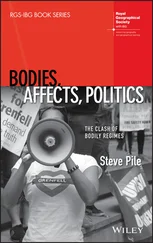Marwan the Pure did not reveal his secret. He scorned himself to the measure that others esteemed his worth. He despised others to the measure that he valued himself. He deafened his ears to the sound of the tearing that echoed so loudly inside him but that no one else could hear. The closed circle of his life tightened around him. He dedicated himself to fasting and isolation and worship as his heart fractured in agonizing pain.
Marwan did not reveal his secret to anyone. He did not dare, in his aloneness and apartness, to extend his hands to his Lord, in hopes that He might show him the way. For Marwan was certain that he knew the right path: this was the only one. He was the Pure One and he must remain thus, as people had come to know him, as his mother had willed him to be, as he himself had been convinced of. This thieving hand of his — he would amputate it if it returned to its ways.
After his father died and his mother came out of her mourning period, he snuck into her room one night and stole her new perfume, his father’s silver dagger, and a paltry sum of money he found on the table. Moments before dawn he cut the veins in his thieving hand with the sharp dagger blade. Ever pure, ever alone, Marwan bled to death.
In the 1890s a major slump in the Omani date trade drove a young merchant by the name of Hilal to seek a new source of profit that would let him benefit from all the mercantile experience he’d already accumulated. Resourceful Hilal realised quickly that the arms trade was the smart alternative. Sultan Faisal’s 1891 proclamation instructed Omanis to refrain from importing weapons into Jawadir Port, but Merchant Hilal and his commerce-savvy friends became increasingly dependent on weapons as a sure source of profit, especially since they could channel guns to the Afghans who seemed to need a constant supply for their raids and their feuds. Loads of smuggled weapons came in from Persian merchants on the coast, to be stored in clandestine warehouses until they could be sold to men coming from the tribes of Baluchistan and Afghanistan. Some merchants succeeded in smuggling weapons all the way to India and Zanzibar, but Merchant Hilal preferred dealing with the Afghans and Persians, since he believed that the port of Jawadir was a safer bet than any of the other possibilities. But Hilal found his commerce badly reversed after taxes were raised on weapons imports. Never mind, though — the trade revived with the new century, and Hilal joined forces with a group of Indian merchants who were importing guns directly from Europe. They were led by a man called Kemji Ram Das. On the 22nd of January 1908, when the S.S. Jayuladala arrived in the port of Muscat coming from Europe, Merchant Hilal’s share was fifty full chests of ammunition. He’d already managed to sell popcorn rifles in Jawadir port for seventy dollars each and that made him a rich man very quickly. Now he sought marriage into a shaykhly family in al-Awafi. His son and heir, Sulayman, was born after more than ten years of marriage.
Nevertheless, his son’s arrival must be a good omen, thought Merchant Hilal. A good start to founding a dynasty. Siblings would surely arrive. But every boy born to Hilal after Sulayman was kidnapped by death while still a nursing baby. People whispered that Sulayman was afflicted with qashi’a , and the disease must be fatal to his little brothers. His father took him to a specialist who sat the little boy in front of him and peered into his skull to find the errant vein in his head that — if it flared and moved too far — would mean the death of every boy born after him. When the doctor pinpointed the location of the vein, he shouted the news at the top of his voice. He heated a metal skewer over a flame and seared Sulayman’s head where he believed the vein — or the qashi’a — to be, until it died completely, never making another appearance that would kill his male siblings. So Merchant Hilal had three children who lived: Sulayman and his very last son Ishaq.
There was also a girl, scrawny and pale, who spent her entire childhood as a recluse, mind and body shut away, until she was married off to a maternal cousin, and later on, to that cousin’s brother. Both cousins divorced her in turn. Zarifa hated her.
Ishaq resembled his mother in her hesitant bearing and introversion. It was Sulayman who inherited everything: his father’s mercantile savvy, quick mind, tall and imposing figure, grave dignity, and the large house built of plaster — as well as his nervous disposition and the title of Merchant. But Sulayman did not trade in weapons. To all appearances, dates were what occupied his work days, although his real profits were built on the slave trade.
In her shut-away room that had once been a threshing floor, Masouda realised that her daughter Shanna had gone away with her husband, Sanjar. She knew she would not see her daughter again, and that now, her food and hygiene were hostage to the charity of the neighbour women.
Day by day her voice grew fainter as she repeated, I am here... over here. I am Masouda. Her frame was more bent than ever. In odd moments neighbours asked themselves if Masouda would be buried in her misshapen posture or whether, after death, her spine would regain its straightness.
Memories of the distant past, as cloudy as they were, began to fill Masouda’s head as the days she was living through and those just before grew ever more absent. She began to see moments in time that, years ago, she had not believed her head would ever be capable of facing.
She saw a thick dark dawn and herself going to gather wood. She heard a rustling in the room of Merchant Sulayman. She could not control her natural curiosity. She pressed herself to the wall and peered into the back window.
He and his wife had been sleeping in separate rooms since the birth of his son Abdallah three weeks before, so he was alone when his sister rapped on the door and immediately, without hearing a response, opened it and came in. He turned in his bed. Everything all right? he asked, startled.
She stared at him. Your wife, she said.
He got out of bed, took his dishdasha from the iron hook and struggled into it. He faced his sister. What about my wife? What’s wrong? You’re the one who said to me, Get married, stop doing your business with the slave women. So I married this woman. Then you carped at me, Why haven’t you had a baby yet? And she’s had this boy. What do you want now?
He was sitting on the edge of the bed. She stood over him. Her voice, always low, was quiet now, but he heard her. I saw her, she said. Her and Saleem, Shaykh Said’s slave. At the basil bush.
Merchant Sulayman began to shiver. She finished what she had to say without any change in the tone of her voice: Never mind, leave it all to me. And she went out.
That morning, Merchant Sulayman had to travel to Salalah for some business. When he returned three months later, his wife had died, leaving tiny Abdallah in the care of his paternal aunt. Saleem, Shaykh Said’s slave, had vanished.
Masouda thought she had obliterated this murky dawn scene from her mind.
I am not sitting in this seat suspended between heaven and earth waiting to arrive in Frankfurt any moment now. I am in Zarifa’s lap in the east courtyard of the Big House, my eyes open to the full moon high in the sky, Zarifa is stroking my hair and telling me a story.
Every day when Mama Goat left the house, she warned her oldest children, Zayd and Rabab, saying, If anyone knocks, do not open the door. It could be Mr Wolf and he would eat you up. If it’s me at the door, I will say, Yoo Rabab, yoo Zayd, open the door! On your mama’s back there’s grass to eat, and good good milk in each teat! When you hear me say that, you can open the door. So the children obeyed her. But one day Mr Wolf heard Mama Goat reminding her children what to do. After she’d gone, he began rapping on the door, and saying, Yoo Rabab, yoo Zayd, open the door! On your mama’s back there’s grass to eat, and good good milk in each teat! He’d changed his voice and he fooled the children. They opened the door and Mr Wolf ate them up.
Читать дальше












